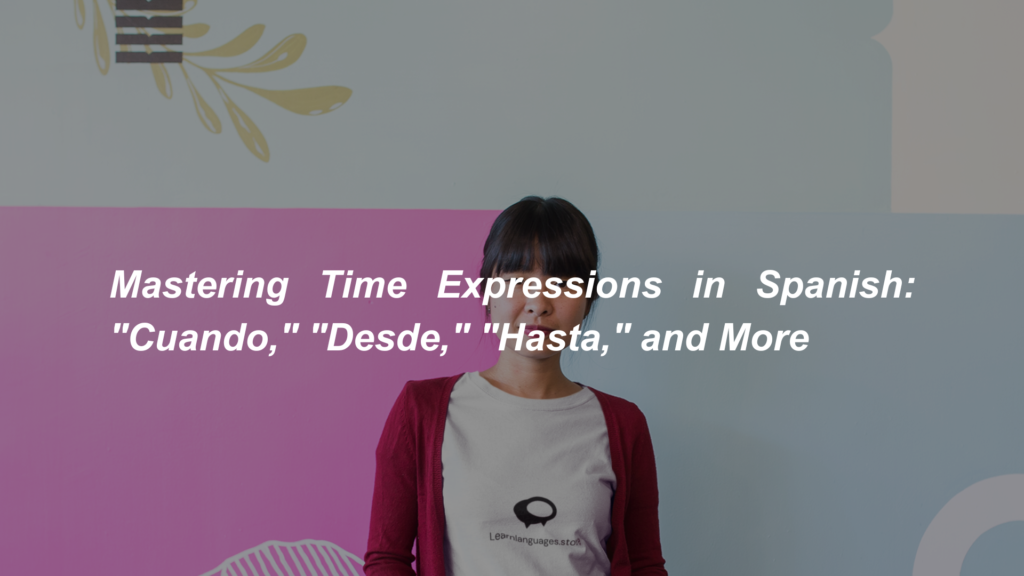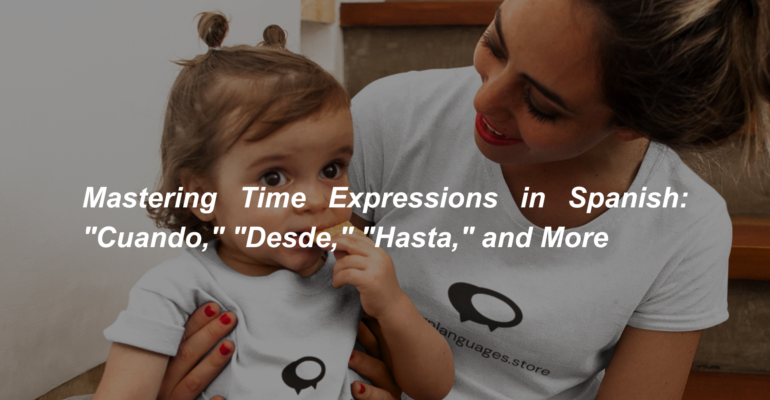Mastering Time Expressions in Spanish: “Cuando,” “Desde,” “Hasta,” and More
Mastering Time Expressions in Spanish: “Cuando,” “Desde,” “Hasta,” and More
Estimated reading time: 8 minutes
Understanding time expressions is a critical part of mastering any language, and Spanish is no exception. Whether you’re talking about when something happened, how long it lasted, or when it will end, time expressions are essential for clear and accurate communication. For learners who are already fluent in English and Hindi, getting a handle on Spanish time expressions like “cuando,” “desde,” “hasta,” and others can help bridge gaps between everyday conversations and more advanced communication.
In this blog, we’ll explore key time expressions in Spanish, break down their forms, meanings, and usage, and compare them to their English and Hindi equivalents. This will help you understand how similar structures work across the three languages, making it easier to master Spanish time expressions.

Introduction to Spanish Time Expressions
Time expressions in Spanish, much like in Hindi and English, help us indicate when something happened or is going to happen. These expressions allow us to structure sentences around events and their relation to time. From indicating specific moments to durations or time limits, expressions like cuando (when), desde (since), hasta (until), and others are pivotal in helping learners convey precise meaning.
Understanding how to use these expressions correctly is crucial in everyday conversations as they provide context, order, and clarity to our speech. Let’s dive into the most commonly used time expressions in Spanish and see how they work.
Key Time Expressions in Spanish
1. Cuando (When)
Cuando is used to talk about when something happens. It can introduce both questions (when asking about time) and statements (when indicating time or events).
- Example (Question):
¿Cuándo llegas?
(When are you arriving?)
Hindi: तुम कब आ रहे हो? (Tum kab aa rahe ho?) - Example (Statement):
Cuando llegué, ya habían comido.
(When I arrived, they had already eaten.)
Hindi: जब मैं आया, तब तक वे खा चुके थे। (Jab main aaya, tab tak ve khaa chuke the.)
Comparison with English and Hindi:
In English, “when” is used exactly like cuando in Spanish. In Hindi, “जब” (jab) is used for “when” in the context of events and actions.
2. Desde (Since/From)
Desde is used to indicate the starting point of an action or event. It answers the question “since when” or “from when.”
- Example:
Vivo aquí desde 2010.
(I have lived here since 2010.)
Hindi: मैं 2010 से यहाँ रह रहा हूँ। (Main 2010 se yahaan reh raha hoon.)
Comparison with English and Hindi:
In English, “since” or “from” is used similarly to Spanish desde. In Hindi, “से” (se) is used to express the same meaning, indicating the starting point of an action.
3. Hasta (Until)
Hasta indicates the end point of an action or event. It tells us how long something lasts or when something will stop.
- Example:
Trabajamos hasta las cinco.
(We work until five.)
Hindi: हम पांच बजे तक काम करते हैं। (Hum paanch baje tak kaam karte hain.)
Comparison with English and Hindi:
In English, “until” is used to express the same meaning. In Hindi, “तक” (tak) is commonly used to indicate “until.”
4. Desde… Hasta (From… Until)
This combination is used to express a range of time. It indicates both the starting point and the ending point of an event or action.
- Example:
Trabajo desde las nueve hasta las seis.
(I work from nine until six.)
Hindi: मैं नौ बजे से छह बजे तक काम करता हूँ। (Main nau baje se chhah baje tak kaam karta hoon.)
5. Mientras (While)
Mientras means while and is used to indicate that two actions are happening at the same time.
- Example:
Ella cocinaba mientras yo estudiaba.
(She was cooking while I was studying.)
Hindi: वह खाना बना रही थी जबकि मैं पढ़ाई कर रहा था। (Vah khaana bana rahi thi jabki main padhai kar raha tha.)
Comparison with English and Hindi:
Mientras is equivalent to “while” in English. In Hindi, “जबकि” (jabki) or “जब” (jab) can be used to express simultaneous actions.
6. Antes de (Before)
Antes de is used to express something that happens before another action or time.
- Example:
Antes de comer, me lavo las manos.
(Before eating, I wash my hands.)
Hindi: खाने से पहले मैं हाथ धोता हूँ। (Khaane se pehle main haath dhota hoon.)
7. Después de (After)
Después de means after and is used to show that something happens following another action or event.
- Example:
Voy al gimnasio después de trabajar.
(I go to the gym after working.)
Hindi: काम करने के बाद मैं जिम जाता हूँ। (Kaam karne ke baad main gym jaata hoon.)
Grammar Pattern Breakdown: Using Time Expressions in Spanish
Let’s break down how these time expressions are used in a sentence.
1. Prepositions and Clauses
- Cuando (when) is often followed by a verb in either the present, past, or future tense, depending on the context.
- Desde (since) and hasta (until) are prepositions that need to be followed by a specific time or event. They can also be used with desde que (since) to introduce a clause.
Example:
- Desde que te vi, supe que seríamos amigos.
(Since I saw you, I knew we would be friends.)
Hindi: जबसे मैंने तुम्हें देखा, मुझे पता था कि हम दोस्त बनेंगे। (Jabse maine tumhein dekha, mujhe pata tha ki hum dost banenge.)
2. Tense Agreement
- Antes de and después de are followed by an infinitive verb or a noun.
Example: Antes de dormir (Before sleeping), Después de la escuela (After school). - Mientras requires two actions to be happening at the same time, so both verbs should be in the same tense (either both in the past or both in the present).
3. Combining Prepositions
Spanish often combines these time expressions for greater precision, like desde… hasta (from… until) or antes de… después de (before… after).
Example:
- Estudié desde las ocho hasta las diez.
(I studied from 8 to 10.)
Hindi: मैंने आठ बजे से दस बजे तक पढ़ाई की। (Maine aath baje se das baje tak padhai ki.)
List of Exceptions and Irregularities
While time expressions in Spanish are relatively straightforward, there are a few nuances to consider:
- Desde que is used when you want to follow desde with a verb rather than a time or event. For example: Desde que me mudé a Madrid (Since I moved to Madrid).
- Hasta que is used similarly with a verb to mean “until something happens”: No salgas hasta que termine la película (Don’t leave until the movie ends).
- Cuando can sometimes introduce a subjunctive clause, especially when referring to future events or hypothetical situations.
Example: Cuando tengas tiempo, llámame. (When you have time, call me.)
-
Product on sale
 French DELF B1
French DELF B1₹32,600.00
₹42,600.00
Example Sentences Using Spanish Time Expressions
- Spanish: Cuando termine la clase, iremos a cenar.
English: When the class finishes, we will go to dinner.
Hindi: जब क्लास खत्म होगी, हम डिनर के लिए जाएंगे। (Jab class khatam hogi, hum dinner ke liye jaayenge.) - Spanish: Desde que llegué, estoy cansado.
English: Since I arrived, I’ve been tired.
Hindi: जबसे मैं आया हूँ, मैं थका हुआ हूँ। (Jabse main aaya hoon, main thaka hua hoon.) - Spanish: Trabajo desde las nueve hasta las cinco todos los días.
English: I work from nine to five every day.
Hindi: मैं हर दिन नौ से पांच तक काम करता हूँ। (Main har din nau se paanch tak kaam karta hoon.) - Spanish: Nunca llegues antes de las ocho.
English: Never arrive before eight.
Hindi: कभी भी आठ बजे से पहले मत आना। (Kabhi bhi aath baje se pehle mat aana.) - Spanish: Después de la cena, vamos a ver una película.
English: After dinner, we are going to watch a movie.
Hindi: डिनर के बाद हम फिल्म देखने जा रहे हैं। (Dinner ke baad hum film dekhne ja rahe hain.) - Spanish: Mientras yo cocino, tú limpias la mesa.
English: While I cook, you clean the table.
Hindi: जब मैं खाना बना रहा हूँ, तब तुम मेज साफ करो। (Jab main khaana bana raha hoon, tab tum mej saaf karo.)
Frequently Asked Questions (FAQs)
Conclusion
Mastering time expressions in Spanish is essential for speaking and writing more naturally. By understanding how to use words like cuando, desde, and hasta, you can convey precise information about when actions occur or how long they last. With practice, these expressions will become second nature in your Spanish conversations. Keep comparing these structures to English and Hindi, and soon you’ll be able to switch between the three languages effortlessly!
Enhance Your Spanish Skills!
To improve your Spanish further, consider enrolling in our Spanish Course at Learn Languages Store for just Rs. 16,300. Our courses are designed to help you build a strong foundation in the Spanish language in a fun and engaging way.
Contact Us to Learn More!
For more information about our courses, feel free to reach out to us at:
Address:
330, 3rd Floor, Big Splash (Near Vashi Bus Depot),
Sector 17, Vashi,
Navi Mumbai, Maharashtra 400703
Phone: +91-9594113111
Email: services@learnlanguages.store
Don’t miss the opportunity to enhance your language skills! Sign up today and start your journey to fluency in Spanish!










